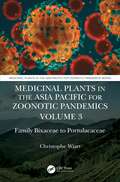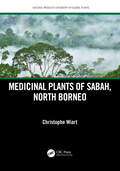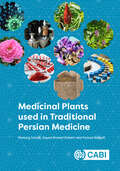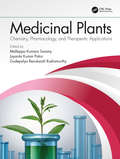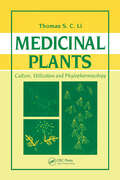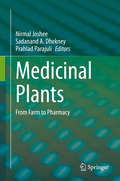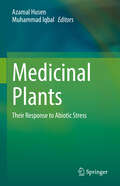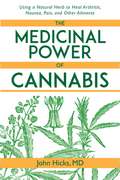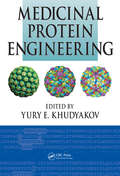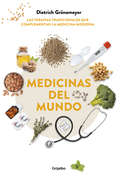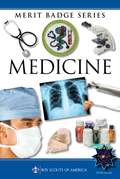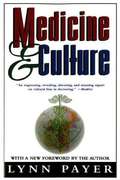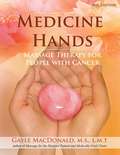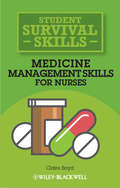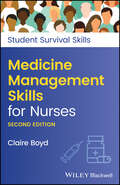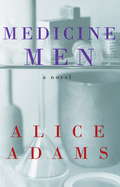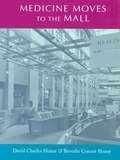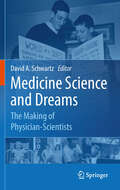- Table View
- List View
Medicinal Plants in the Asia Pacific for Zoonotic Pandemics, Volume 3: Family Bixaceae to Portulacaceae (Medicinal Plants in the Asia Pacific for Zoonotic Pandemics)
by Christophe WiartMedicinal Plants in the Asia Pacific for Zoonotic Pandemics provides an unprecedented, comprehensive overview of the phylogeny, botany, ethnopharmacology, and pharmacology of more than 100 plants used in the traditional systems of Asia and Pacific medicine for the treatment of microbial infections. It discusses their actions and potentials against viruses, bacteria, and fungi that represent a threat of epidemic and pandemic diseases, with an emphasis on the molecular basis and cellular pathways. This book presents for each plant the scientific name, the botanical classification, traditional medicinal uses, active chemical constituents, and pharmacology. This volume is a critical reference for anyone involved in the discovery of leads for the development of lead molecules or phytopharmaceutical products for the prevention or treatment of pandemic viral, bacterial, or fungal infections. FEATURES Includes phylogenetic presentation of medicinal plants and a chemotaxonomical rationale of antiviral, antibacterial, and antifungal actions Discusses chemical structure–activity relationship, pharmacokinetics, and oral bioavailability of antimicrobial principles Introduces the molecular mechanism of natural products on viruses, bacteria, and fungi Contains a selection of botanical plates and useful bibliographic references This book is a useful research tool for postgraduates, academics, and the pharmaceutical, herbal, and nutrition industries. Medicinal Plants in the Asia Pacific for Zoonotic Pandemics includes commentary sections that invite further research and reflection on the fascinating and timely subject of the development of leads or herbals from Asia-Pacific medicinal plants to safeguard humanity against the forthcoming waves of viral, bacterial, or fungal pandemics. This book is an ideal reference text for medicinal plant enthusiasts.
Medicinal Plants in the Asia Pacific for Zoonotic Pandemics, Volume 4: Family Cornaceae to Apiaceae (Medicinal Plants in the Asia Pacific for Zoonotic Pandemics #4)
by Christophe WiartViruses and plagues have constantly threatened the survival of humanity since the evolution of modern man. Medical advances, thanks to the application of remedial plants, have helped to fight back against some of the most nefarious bacterial and viral infections, giving humanity a fighting chance. This fourth volume in the Medicinal Plants in the Asia Pacific for Zoonotic Pandemics series provides an unprecedented, comprehensive overview of the pharmacological activity of more than 100 medicinal plants used for the treatment of microbial infections in Asia and the Pacific. The text discusses the actions of such plants against viruses and bacteria representing a threat of epidemic and pandemic diseases, including COVID-19, with an emphasis on the molecular basis and cellular pathways. Scientific names, botanical classifications and descriptions, medicinal uses, and chemical constituents are presented, along with chemical structures and a vast selection of bibliographical references. FEATURES Introduces the molecular mechanism of natural products from medicinal plants in Asia on bacteria and viruses Includes phylogenetic presentations of a selection of medicinal plants and a chemotaxonomical rationale of antiviral and antibacterial actions Discusses the chemical structure–activity relationship, pharmacokinetics, and bioavailability of antimicrobial principles This book is a useful research tool for postgraduates, academics, and the pharmaceutical, herbal, and nutrition industries looking forward to developing antiviral and antibacterial agents from medicinal plants in Asia. Medicinal Plants in the Asia Pacific for Zoonotic Pandemics is a critical reference for anyone involved in the discovery of leads for the treatment of pandemic viral, bacterial, and infections. "This book will be an important resource for scientists, as well as people passionate about helping to save these critical resources. Perhaps a new drug lead will be identified from at least one of these plants." —From the Foreword by Dr. Mark S. Butler, MSBChem Consulting, Brisbane, Australia
Medicinal Plants of China, Korea, and Japan: Bioresources for Tomorrow's Drugs and Cosmetics
by Christophe WiartAsian medicinal plants show great promise in pharmaceutical and cosmetological development. Researchers engaged in the discovery of new leads in these areas need robust conceptual tools and understanding of interrelated basics of botany, ethnobotany, biomolecular pharmacology, phytochemistry, and medicinal chemistry to guide their investigations. M
Medicinal Plants of Sabah, North Borneo (Natural Products Chemistry of Global Plants)
by Christophe WiartResearchers in the field of natural product chemistry and pharmacology focus on discovering new drugs from medicinal plants. The medicinal plants of Sabah (North Borneo), many of which are found in all of Asia and the Pacific, represent a vast array of resources that could be used for the discovery of drugs and the development of cosmetics as well as functional food. No other book focuses on the medicinal plants from this part of the globe in such depth. The author is well known in natural products and this text will appeal to a global audience in presenting the botanical description, chemical constituents, pharmacology, pharmaceutical, cosmetic, and functional food potentials of these plants.Features: Describes in a phylogenetic order the habitats, distributions, botanical descriptions, local names, uses, chemical constituents, pharmacological activities, and toxic effects of more than 250 species of medicinal plants of Sabah Provides a selection of botanical plates of medicinal plants endemic to Sabah, hand-drawn by the author Provides comment sections to invite further research on the topic of the development of drugs, dietary products, and cosmetics from Sabah medicinal plants
Medicinal Plants used in Traditional Persian Medicine
by Roja Rahimi Mamak Hashemi Abadi Maryam Akabery Seyyed Ahmad Askari Sayyedeh Fatemeh Askari Zahra Ayati Sajad Azad Parmis Badr Hamed Baharara Zahra Boghrati Mina Borhani Fatemeh Etemadpour Seyed Majid Ghazanfari Shakila Hajizadeh Bahia Namavar Jahromi Lida Jarahi Mohammad Reza Kanani Seyedeh Mahnaz Karimi Abdolali Mohagheghzadeh Leila Mohtashami Ghazaleh Mosleh Nayebzadeh Motahare Maryam Nikoosokhan Zahra Taghipour Mojgan Tansaz Meysam Zaeri Elaheh Zibaee Roodabeh Bahramsoltani Amir Hossein AbdolghaffariMedicinal plants and the natural products within them, still remain the starting point for breakthroughs in the development of safe, pharmacologically active synthetic molecules for use in a wide variety of clinical situations. Traditional Persian Medicine (TPM) is one of the most ancient medical doctrines, and is well-documented in terms of information about diseases, diagnoses and treatments, especially in the application of medicinal plants. TPM has been used for centuries worldwide, and many of these methods are still used in Iran today. The book introduces the basics of TPM, and describes the key medicinal plants used for the treatment of different diseases. It also highlights possible new targets for research activities in drug discovery of natural products. The book is richly illustrated with historic drawings from old Persian pharmacopoeia and photos of plants in their natural habitats. Reference to Ayurvedic, Traditional Chinese Medicine and monastic medicine in Europe are also made. While knowledge about medicinal plants used in TPM still exists in Iran there is a risk that the detailed expertise provided by older generations will be lost in the near future. It is therefore very important that this cultural heritage is properly preserved. This book provides a valuable, evidence-based resource on TPM for researchers, practitioners and students in medicinal plants, ethnobotany and herbal medicine.
Medicinal Plants: Chemistry, Pharmacology, and Therapeutic Applications
by Jayanta Kumar Patra Mallappa Kumara Swamy Gudepalya Renukaiah RudramurthyThis book details several important medicinal plants, their occurrence, plant compounds and their chemical structures, and pharmacological properties against various human diseases. It also gives information on isolation and structural elucidation of phytocompounds, bio-assays, metabolomic studies, and therapeutical applications of plant compounds.
Medicinal Plants: Culture, Utilization and Phytopharmacology
by Thomas S. LiMedicinal Plants: Culture, Utilization and Phytopharmacology covers over 400 species. Each chapter gathers valuable information from a wide variety of sources, and supplies it to the user in convenient table format, arranged alphabetically by scientific name, followed by the common name. Data topics include: major constituents (active ingredients)
Medicinal Plants: From Farm to Pharmacy
by Nirmal Joshee Sadanand A. Dhekney Prahlad ParajuliThis book offers a fresh look on a variety of issues concerning herbal medicine - the methods of growing and harvesting various medicinal plants; their phytochemical content; medicinal usage; regulatory issues; and mechanism of action against myriad of human and animal ailments. ‘Medicinal Plants: From Farm to Pharmacy’ comprises chapters authored by renowned experts from academics and industry from all over the world. It provides timely, in-depth study/analysis of medicinal plants that are already available in the market as supplements or drug components, while also introducing several traditional herbs with potential medicinal applications from various regions of the world. The book caters to the needs of a diverse group of readers: plant growers, who are looking for ways to enhance the value of their crops by increasing phytochemical content of plant products; biomedical scientists who are studying newer applications for crude herbal extracts or isolated phytochemicals; clinicians and pharmacologists who are studying interactions of herbal compounds with conventional treatment modalities; entrepreneurs who are navigating ways to bring novel herbal supplements to the market; and finally, natural medicine enthusiasts and end-users who want to learn how herbal compounds are produced in nature, how do they work and how are they used in traditional or modern medicine for various disease indications.
Medicinal Plants: Healthy Through the Power of Nature
by Dr Angela FetznerWhat Will I Find in This Book? Herbal medicine - the oldest form of treatment in the world Natural remedies, especially medicinal plants, have long been the only remedy for doctors and pharmacists. Medicinal plants also served as important raw materials for the production of medicines. Determine, collect and dry medicinal plants Medicinal plants can be found almost everywhere in nature - on meadows, in the forest, on the wayside. This book explains how to collect medicinal plants and determine which plant parts to use, whether it’s the flowers, leaves, fruits, roots or bark. Herbal preparations - medicinal plants can be used in a variety of ways The simplest usage form of medicinal herbs is tea. However, there is a far greater range of uses of medicinal plants. Known medicinal herb preparations include e.g. tinctures, ointments, creams; they can also be used in baths. The book provides an overview of the preparation and use of the individual dosage forms.
Medicinal Plants: Their Response to Abiotic Stress
by Muhammad Iqbal Azamal HusenThis book provides a comprehensive overview of medicinal plants and their interaction with abiotic stress in terms of morphological, physiological, biochemical, and molecular variations, and explains the adaptation and tolerance mechanisms involved. It presents various mechanisms that become operative in medicinal plants to combat stressful situations. The book discusses the secondary metabolites and/or bioactive compounds produced in medicinal plants under abiotic stress conditions, and the use of biostimulants and/or phytoprotectants to alleviate the adverse effects of abiotic stresses on medicinal plants. Additionally, it is likely to address opportunities and challenges in molecular and omics studies of medicinal plants under abiotic stress conditions. Overall, the chapters are developed by eminent subject experts with due care and clarity and cover an up-to-date literature review with relevant illustrations. The book would cater to the need of graduate and post-graduate students, researchers as well as scientists, and may attract the attention of pharmaceutical companies/industrialists and health policymakers.
Medicinal Power of Cannabis: Using a Natural Herb to Heal Arthritis, Nausea, Pain, and Other Ailments
by John HicksIt's no surprise that marijuana has healing powers, but whether or not using it to treat common ailments should be legalized continues to be a hot topic of debate among government leaders and medical practitioners alike. Marijuana comes from the cannabis plant, an herb whose leaves can be extracted and used as a recreational drug, allowing users to feel a euphoric high. But the cannabis plant has many non-psychoactive properties as well. Cannabidiol, also known as CBD is a substance extracted from the cannabis plant that has been proven to have all the healing powers of marijuana without the psychoactive properties. With over thirty years of experience in integrated holistic health, Dr. John Hicks presents here his extensive knowledge and research. In this revolutionary book, Dr. Hicks touches on an area of holistic health that many medical practitioners have over looked in the past. He begins by explaining the root cause of most diseases--inflammation--and then illustrates how inflammation progresses into the various diseases and ailments that plague us. Finally, he shows how CBD can stop the inflammation and heal the problem. CBD has been shown to help: Anxiety Alzheimer's disease Seizures Huntington's disease Nausea and vomiting And much, much more With information ranging from easy-to-understand terminology to scientific studies based on Hick’s decades of experience in integrative medicine, this book has a little bit of something for everyone, from your typical hypochondriac to the seasoned medical practitioner.
Medicinal Protein Engineering
by Yury E. KhudyakovAn All-Inclusive Review of the Achievements and Trends in the Fast-Growing Protein Engineering Field From humble beginnings like making fire for mere survival, engineering now steadfastly penetrates all aspects of our lives and even life itself at the molecular level. Protein engineering is a molecular biological discipline focused on designing and
Medicinal and Aromatic Plants of India, Vol. 3 (Medicinal and Aromatic Plants of the World #11)
by Ákos Máthé Irfan Ali KhanThis book is the 11th volume of the popular series "Medicinal and Aromatic Plants of the World". It is a comprehensive compilation of 30 chapters on selected important species representative of India's rich and diverse flora. This collection provides current scientific information highlighting the traditional, contemporary, and prospective uses of both well-known and lesser-known plant species. The volume serves as a bridge between traditional knowledge and modern scientific advancements, providing a critical analysis of this broad interdisciplinary field with a particular focus on India. The chapters cover topics such as the pharmacological properties, biochemical composition, and therapeutic applications of these plants. Readers will find contributions by renowned scholars who delve into the innovative product development stemming from the ancient medicinal plant systems. Particular attention is given to how these plants can contribute to health and wellness in the era of global climate change and pandemics. This book invites readers to face critical questions about the survival and utilization of medicinal and aromatic plants in India. Researchers, scholars, and practitioners in fields of botany, pharmacology, and traditional medicine will find this volume invaluable. It is also an essential resource for anyone interested in botanicals, plant-based nutraceuticals and herbal formulations. Whether you are an academic or a professional working in the field of medicinal plants, this book offers a wealth of knowledge that bridges rich ancient traditions with modern science.
Medicinal and Aromatic Plants of South America Vol. 2: Argentina, Chile and Uruguay (Medicinal and Aromatic Plants of the World #7)
by Ákos Máthé Arnaldo BandoniThis volume, as the seventh of the series Medicinal and Aromatic Plants of the World, deals with the medicinal and aromatic plant (MAPs) treasures of the so-called Southern Cone, the three southernmost countries (Argentina, Chile and Uruguay) of South America. Similarly to the previous volumes of the series, the main focus is to collect and provide information on major aspects of botany, traditional usage, chemistry, production / collection practices, trade and utilization of this specific group of plants. The contributors, who are recognized professionals and specialist of the domain, have collected and present state of the art information on 41 species. Most of these are not only of interest from the scientific point of view, but hold also a potential for the prospective utilization of the decreasing, occasionally overexploited / endangered medicinal plant resources of this huge continent. The book is expected to serve as a source of information also on some less known or less studied species. As such the volume is expected to support future research and public health professionals.
Medicinal and Aromatic Plants: Healthcare and Industrial Applications
by Khalid Rehman Hakeem Tariq AftabBefore the concept of history began, humans undoubtedly acquired life benefits by discovering medicinal and aromatic plants (MAPs) that were food and medicine. Today, a variety of available herbs and spices are used and enjoyed throughout the world and continue to promote good health. The international market is also quite welcoming for MAPs and essential oils. The increasing environment and nature conscious buyers encourage producers to produce high quality essential oils. These consumer choices lead to growing preference for organic and herbal based products in the world market. As the benefits of medicinal and aromatic plants are recognized, these plants will have a special role for humans in the future. Until last century, the production of botanicals relies to a large degree on wild-collection. However, the increasing commercial collection, largely unmonitored trade, and habitat loss lead to an incomparably growing pressure on plant populations in the wild. Therefore, medicinal and aromatic plants are of high priority for conservation. Given the above, we bring forth a comprehensive volume, “Medicinal and Aromatic Plants: Healthcare and Industrial Applications”, highlighting the various healthcare, industrial and pharmaceutical applications that are being used on these immensely important MAPs and its future prospects. This collection of chapters from the different areas dealing with MAPs caters to the need of all those who are working or have interest in the above topic.
Medicinal and Other Uses of North American Plants: A Historical Survey with Special Reference to the Eastern Indian Tribes
by Charlotte Erichsen-BrownChronological historical citations document 500 years of usage of plants, trees, and shrubs native to eastern Canada, northeastern U.S. Also complete identifying information. 343 illustrations. "...this is the best Dover reprint relative to medicinal plants in fifteen years . . . you can't go wrong." -- Botanic & Herb Reviews.
Medicinas del mundo: Las terapias tradicionales que complementan la medicina moderna
by Dietrich GrönemeyerTodas las terapias curativas procedentes de las diferentes culturas y países recopiladas por primera vez en un solo volumen. El doctor Grönemeyer nos muestra en este libro, un proyecto al que ha consagrado su vida y su trabajo durante décadas, cómo las técnicas curativas ancestrales pueden enriquecer y complementar la medicina convencional. Para cumplir con su propósito, el autor, uno de los médicos más prominentes de Alemania, viajó por todo el mundo hablando con curanderos y chamanes que quisieran compartir con él siglos de sabiduría: desde el poder curativo de las plantas hasta la meditación pasando por la medicina tradicional china. Recorrió, entre otros muchos países, África, Tíbet, Brasil, Australia y Corea. Ahora Grönemeyer aplica los conocimientos adquiridos en estos periplos para averiguar qué es lo que realmente nos cura: ¿Cómo puede ayudar la meditación a regular el corazón? ¿Podemos curarnos mediante la imposición de las manos? ¿Por qué funciona la acupuntura y el ayurveda? La crítica ha dicho...«No es el primer libro que el doctor Dietrich Grönemeyer haya escrito hasta ahora, pero es sin duda uno de los más importantes.»Rheinische Post «Grönemeyer no quiere quedarse de brazos cruzados y ha cumplido su misión de reunir y registrar los conocimientos tradicionales de curación en forma de libro para iniciar un nuevo capítulo en la historia de la medicina.»PressePortal
Medicine (Merit Badge Series)
by Boy Scouts of America Staff"Enhancing our youths' competitive edge through merit badges'
Medicine And Culture
by Lynn PayerMedicine and Culture Lynn Payer is the author of How to Avoid a Hysterectomy and Disease Mongers: How Doctors, Drug Companies and Insurers Are Making You Feel Sick. She has taught medical writing at New York University, Columbia University, and Indiana University. She is also the editor of Medicine and Culture Update: A Newsletter on International Health Differences, Outcomes, and Values.
Medicine Hands
by Gayle MacdonaldA practical book written for both health professionals and the layperson, this newly revised guide deconstructs common myths about the use of massage in cancer treatment. Reviewing literature that shows cancer to be caused by genetic mutation and the influence of hormones, the opening discussion emphasizes that mechanical action such as massage does not break tumors open or cause them to spread. The book purports that the real medical issues for massage therapists center on ameliorating the discomfort of treatments such as chemotherapy, radiation, and surgery. The topics covered include massage in hospitals, in respite care, for the dying, and for exhausted caregivers, with appendices summarizing research on oncology patients and massage. Charts for the adjustment of massage techniques according to the treatment a patient is undergoing are also included.3rd edition changes:The field of oncology massage is maturing into a discipline with a deeper and deeper body of knowledge. The 3rd edition of Medicine Hands reflects this maturation. Every chapter contains updated information and insights into massaging people affected by cancer. New chapters have been added to cover each stage of the cancer experience: treatment, recovery, survivorship, side effects from the disease, and end of life. These new chapters and organizational structure will make it easier for the reader to find the information needed to plan the massage session for a given client. As well, a new chapter has been added that focuses on the Pressure/Site/Positioning framework. This is the clinical framework around which the massage session is planned.The scientific research on the effects of massage for people with cancer is updated to 2013. New in the 3rd edition is material devoted to massaging young adult survivors, the person with breast reconstruction, cording, and late effects as well as thoughts for therapists and clients who are considering the use of massage as part of a detoxification process.All of the features most enjoyed by past readers have been retained-the inspirational sidebar quotes, client and therapist anecdotes, info boxes, and therapists questions and answers. To augment the learning process, written exercises have been added for student therapists and all of those who want to participate in their own learning. As well, sample session write-ups have been included to show the reader the variety of touch modalities that can be used to for people living with cancer.Finally, the 3rd edition will be full color with new color photographs.
Medicine Management Skills for Nurses
by Claire BoydAnxious about managing medicines? Worried you'll make a mistake? This handy book is an essential guide for all nursing students, enabling you to understand the theory and practice of drug administration and facilitate your confidence and competence.This essential guide explores the theory and practice of drug administration briefly and coherently, with 'test your knowledge' exercises and questions throughout to assess your learning. It also includes 'words of wisdom'- tips from real life students from their own experiences. Ideal for carrying to clinical placements, Medicine Management Skills for Nurses is an essential guide to drugs and medicine administration.Special features: - Pocket sized for portability - Clear, straightforward, and jargon-free- Takes away the fear of drugs and medicines management, making it approachable, easy and fun- Features tips and advice from real life nursing students - Ties in with the NMC standards for pre-registration education and the Essential Skills Clusters - Examples and questions based on real life nursing and healthcare examples
Medicine Management Skills for Nurses (Student Survival Skills)
by Claire BoydAn invaluable nursing handbook to increase your confidence with medicine management In the newly revised Second Edition of Medicine Management Skills for Nurses, renowned nursing trainer Claire Boyd delivers a concise, pocket-sized companion to the subject of medicines management and drug administration that’s perfect for student nurses, associate practitioners, and newly qualified registered nurses. Part of the popular Student Survival Skills series, this edition includes tips, advice, and words of wisdom from nursing students written for people working through the nursing curriculum. It mirrors the standards set by the Nursing and Midwifery Council and contains interactive student activities throughout the book. An ideal companion to the forthcoming Calculation Skills for Nurses, 2nd Edition, the latest edition of Medicine Management Skills for Nurses is packed with conversational, accessible guidance to help you understand and handle medicines with confidence and competence. It also includes: Thorough introductions to the general principles of drug administration and to pharmacokinetic and pharmacodynamic concepts Comprehensive explorations of oral drug administration and administration by injection Practical discussions of calculations for working out medicine dosages In-depth examinations of specific, commonly used drugs and individual medical conditions, as well as pain management Ideal for pre-registration nursing students and nursing associates, the latest edition of Medicine Management Skills for Nurses is an indispensable resource for anyone seeking practical and student-centered advice for managing medicines in a clinical environment.
Medicine Men
by Alice AdamsIn a novel that brilliantly conjures up the resilience of the human spirit, Alice Adams draws a clear-eyed portrait of a woman who must overcome her resistance to the help offered by others. Molly Brenner suffers from guilt and headaches. The guilt arrives with the insurance money she receives after the accidental death of her second husband (she was on the verge of separating). And the headaches she at first thinks are just a neurotic manifestation, but when she is diagnosed with a malignancy, she finds herself once again depending on a man, this time from a profession she loathes, the medical profession.
Medicine Moves to the Mall (Center Books on Space, Place, and Time)
by David Charles Sloane Beverlie Conant SloaneThe shopping mall seems an unlikely place to go for health care services. Yet, the mall has become home to such services as well as a model for redesigning other health care facilities. In Medicine Moves to the Mall, David Charles Sloane and Beverlie Conant Sloane document the historical changes to our health care landscape by exploring the interactions between medicine and place. This unique combination of architectural history and the history of medicine provides a thought-provoking analysis of the geography of the practice of medicine.The book presents three essays, each accompanied by a gallery of historical and recent photos. The authors discuss the rise of modern hospitals and how they were shaped into scientifically sterile and humanly stark "medical workshops." Starting in the 1970s, hospital facilities were altered in appearance to become more friendly and welcoming. The integration of a shopping mall's spaciousness and open design with technology and scientific innovation served in "humanizing the hospital." Most recently, the accessibility and convenience of shopping center and roadside clinics have invited Americans to go "shopping for health" in the increasingly commercialized medical system.Medicine Moves to the Mall will appeal to scholars and professionals in fields ranging from health care to cultural geography and from urban studies to architectural history, as well as to readers interested in the shifting status of medicine in American society.
Medicine Science and Dreams
by David A. SchwartzPhysician-scientists are unusual creatures. While we are drawn to the clinical challenges of our patients, we are also drawn to the opportunities that our patients' medical problems bring to science. This book contains the unique experiences and encounters that drew 20 accomplished physician-scientists to this profession. These personal stories are those of people and circumstances that have had profound effects on our career decisions, our creative opportunities, and our lives. These stories also serve to highlight the lessons learned along the way and the distinct attributes of these women and men of medicine and science. Our combined hope is that our collective biographies will enhance the public understanding of our profession, will move people from medicine to science and from science to medicine, and will inspire those who are contemplating this extraordinary profession. "It is a rare gift to benefit from the collective wisdom of so many individuals at the same time. These physician scientists have provided readers with helpful advice and thoughtful encouragement. The interesting and thought provoking essays in Medicine Science and Dreams can be read and digested one at a time or all at once in sequence. They provide lessons to be learned by any physician-scientist, whether just starting out or in the middle of a research career. Schwartz has done readers a great service and has added to the legacy of these prominent and successful physician-scientists." Book review in JAMA, September 7, 2011--Vol 306, No. 9 by Derek S. Wheeler, MD
